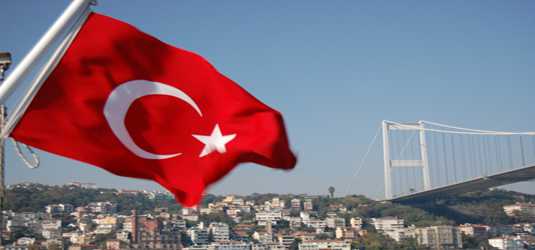Eastern Promises
By ANDREW FINKEL
ISTANBUL — Someone at the Turkish Foreign Ministry must be muttering to Prime Minister Recep Tayyip Erdogan, “Here’s another nice mess you’ve gotten me into.”
Erdogan threw the diplomatic equivalent of a cream pie during a late-night television interview last Friday. Understandably, he was expressing frustration at stalled negotiations over Turkey’s accession to the European Union. Incomprehensibly, he suggested that Turkey join the Shanghai Cooperation Organization instead.
Turkish columnists are now debating whether Erdogan is serious about wanting to play in a different league.
The S.C.O. was set up in 1996 to resolve border disputes between its two largest members, China and Russia. It has since attempted to act as an anti-U.S. bulwark in Central Asia. On Friday, Erdogan described the group as “better and more powerful” than the E.U. and as comprising members — such as Kazakhstan, Kyrgyzstan, Tajikistan and Uzbekistan — with which Turkey has “common values.” He recounted to his interviewer a conversation he had last summer with President Vladimir Putin of Russia during which he said he would willingly stop knocking on the E.U.’s door in exchange for membership in the S.C.O.
Turkish columnists are now debating whether Erdogan is serious about wanting to play in a different league or bluffing in an attempt to force Brussels into serious negotiations. Or he is kicking up a cloud of dust to distract the public from weightier issues like Kurdish rights or lower economic growth? He has been known to propose out of the blue policies that appeal to his conservative base — banning abortion, restoring capital punishment — but that he has little intention of seeing into law.
The prime minister knows he will lose no votes dissing the E.U. Back in 2004 many Turks were enthusiastic about joining the Union; they hoped membership would make Turkey more democratic and provide institutional stability to propel its economy. But even as the country prospered in the intervening years, progress toward E.U. membership has ground to a halt.
On Friday, Erdogan accused the E.U. of dragging its feet because Turkey is an Islamic nation. Many Turks also suspect prejudice. And now, according to a survey [pdf] released last week by the Istanbul-based Center for Economic and Foreign Policy Studies, known as EDAM, only one third of Turks believe Turkey should persist in its quest for E.U. membership. About 15 percent think it should opt for a rival organization.
The presidents of Kyrgyzstan, Uzbekistan, Kazakhstan, China, Tajikistan, Russia and Afghanistan on the eve of the 2008 summit of the Shanghai Cooperation Organization in Dushanbe, Tajikistan.Mikhail Klimentyev/Ria Novosti, via Agence France-Presse — Getty Images The presidents of Kyrgyzstan, Uzbekistan, Kazakhstan, China, Tajikistan, Russia and Afghanistan on the eve of the 2008 summit of the Shanghai Cooperation Organization in Dushanbe, Tajikistan.
When the EDAM pollsters asked foreign policy experts the same question they’d put to ordinary Turks, almost 87 percent answered that Turkey’s future lay with Europe. Less than 3 percent thought it should look elsewhere. On this matter, Erdogan should listen to them, rather than to the crowd.
Whatever his motive for turning his back on Europe, however, Erdogan may have gone too far. Turkey is more dependent on NATO than ever. German and Dutch troops are busy installing defensive Patriot missiles on Turkey’s border with Syria to guard against possible chemical attacks should the civil war against Bashar al-Assad spiral out of control.
If Erdogan really is trying to concentrate the mind of the E.U. bureaucrats in Brussels, joining an organization branded by the International Federation for Human Rights as a “vehicle for human rights violations” would send the wrong signal about the sort of society Turkey aspires to be. In 2009, Russia convinced the S.C.O. to adopt a motion that declared the dissemination of information “harmful to the spiritual, moral and cultural spheres of other states” and a “security threat.” Are these the common values to which Erdogan was referring?
Turkey, like Belarus and Sri Lanka, already is a “dialogue partner” at the S.C.O. That’s as close as it should get to that autocrats’ club.
Andrew Finkel has been a foreign correspondent in Istanbul for over 20 years, as well as a columnist for Turkish-language newspapers. He is the author of the book “Turkey: What Everyone Needs to Know.”
via Turkey Turns Away from Europe, Toward the Shanghai Cooperation Organization – NYTimes.com.


Leave a Reply